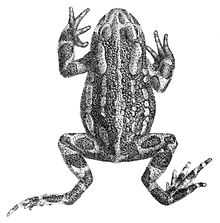Pseudepidalea latastii
| Pseudepidalea latastii | |
|---|---|
 | |
| Conservation status | |
| Scientific classification | |
| Kingdom: | Animalia |
| Phylum: | Chordata |
| Class: | Amphibia |
| Order: | Anura |
| Family: | Bufonidae |
| Genus: | Pseudepidalea |
| Species: | P. latastii |
| Binomial name | |
| Pseudepidalea latastii (Boulenger, 1882) | |
Pseudepidalea latastii (formerly Bufo latastii; also known as the Ladakh toad) is a species of toad found in the north-western Himalayas of India and Pakistan, where it lives between 2,600 and 3,000 metres (8,500 and 9,800 ft).[1]
Description
Crown without bony ridges; snout short, blunt; interorbital space narrower than the upper eyelid; tympanum very distinct, half the diameter of the eye. First finger not extending beyond second; toes two-thirds webbed, with double subartieular tubercles; two moderate metatarsal tubercles; a tarsal fold. The tarsometatarsal articulation reaches the tympanum or the hinder border of the eye. Upper parts with irregular, depressed, distinctly porous warts; parotoids moderate, kidney-shaped; a parotoid-like gland on the calf. Olive above, spotted or marbled with blackish; a light vertebral band; beneath more or less spotted or marbled with blackish.[2]
Snout–vent length 50–62 millimetres (2.0–2.4 in).[3]
References
- ↑ 1.0 1.1 Matthias Stöck, Muhammad Sharif Khan, Sushil Dutta, Annemarie Ohler, Karthikeyan Vasudevan, S.P. Vijayakumar, Theodore Papenfuss, Steven Anderson & Sergius Kuzmin (2004). "Pseudepidalea latastii". IUCN Red List of Threatened Species. Version 2012.1. International Union for Conservation of Nature. Retrieved October 14, 2012.
- ↑ Boulenger, G. A. (1890) Fauna of British India. Reptilia and Batrachia.
- ↑ M. S. Khan (2002). "Pseudepidalea latastii". AmphibiaWeb. Retrieved October 14, 2012.
